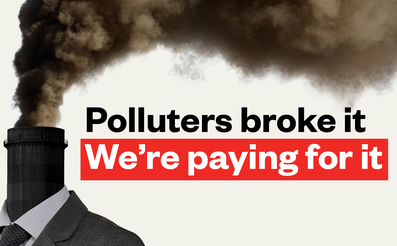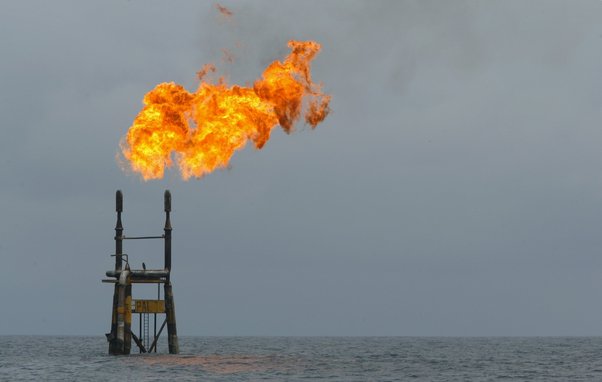With the costs of climate change impacts rapidly rising, the billions pocketed by the fossil fuel industry is an insult to the communities worst hit by extreme weather. It’s time to make polluters pay for the damage they’ve caused

Climate disasters are getting worse, and we know exactly what’s driving them: burning fossil fuels. But somehow oil and gas companies are still raking in billions in profits while communities and governments are left picking up the tab for extreme weather events.
We’re now seeing almost constant coverage of shocking extreme weather across the globe – from back-to-back typhoons in the Philippines to deadly flooding in Spain. This not only costs lives but places huge financial burden on affected communities and the public purse. The 10 costliest climate disasters in 2024 caused over $229 billion in damage.
Meanwhile the fossil fuel industry – which carries most blame for climate breakdown – is booming.
In 2023, the “big five” oil and gas major companies made $121 billion (£93 billion) in profits which works out as $3,833 (£2,949) every second. That’s more than the combined GDP of the 11 lowest-income countries most at risk from climate change.
Those profits haven’t gone back into the communities left picking up the pieces. Instead, they’ve flowed into the pockets of ultra-rich shareholders and CEOs. In the first 11 months of 2024, the global oil and gas industry returned over $213 billion in dividends to shareholders.
And yet, as we approach COP30 – the 30th annual climate summit of world leaders – negotiators are still scratching their heads about how to pay for desperately needed climate action.
Initial pledges to the Fund for Responding to Loss and Damage come to less than 0.2% of the annual cost of climate damages in developing countries, which is estimated to be upwards of $397 billion (£304 billion) per year.
Countries on the frontline of climate change are still being asked to pay for damages they didn’t cause.
The money is there, it’s just in the wrong hands
This isn’t a funding crisis. It’s a fairness crisis. For decades, fossil fuel companies have used their power to rig the system by lobbying against climate laws, suppressing their own scientific evidence and bankrolling climate denial to delay action.
Their success is plain to see in the vast public subsidies still being handed out to their sector, and the fact that oil and gas companies still have no legal duty to pay to repair the damage they’ve caused. In 2022, those subsidies hit a whopping $7 trillion.
While frontline communities are footing the bill for flood damages, storm-hit homes and increasing health and insurance bills, fossil fuel giants are still cashing cheques from taxpayers.
The solution couldn’t be clearer.
Polluters must pay for the damage they’ve caused
Clearly something needs to change. And there’s a fair, popular answer.
A global survey led by Greenpeace and Oxfam found that 81% of people around the world support polluter taxes on fossil fuel companies to pay for climate damages. This isn’t a radical proposal. It’s common sense, and there’s growing political momentum to make polluters pay.
Two US states have passed laws to hold fossil fuel companies financially accountable for climate damages, and several more are pursuing similar measures.
The EU proposed exploring direct contributions from polluters to raise climate finance in their negotiating text at the last COP.
And leaders in Kenya, France and Barbados are heading an international taskforce to make such levies a reality, with many more states pushing this agenda.
These proposals wouldn’t just be a symbolic win – they could release significant amounts of funding to tackle the climate emergency and create a real power shift towards a fairer system.
A polluter profits tax on 590 oil, gas and coal companies across the globe could raise US$400 billion in the first year, according to research by Oxfam. That’s comparable to the projected annual cost of climate damages for developing countries by 2030.
We know what needs to happen to tip the scales away from those profiting towards those who are already paying. But we’re up against a powerful industry that holds keys to the most powerful rooms.
That’s why we’re uniting with multiple campaign groups in our call for polluters to pay for what they’ve broken, and we want you to add your voice. Sign the Polluters Pay Pact.
Sign the Polluters Pay Pact
There’s never been a better time to push for action.
Make governments around the world to make oil, coal and gas corporations pay their fair share for the damage they cause.
We’re calling to introduce new taxes or fines on them to help communities at home and around the world rebuild from climate disasters and invest in climate solutions.



